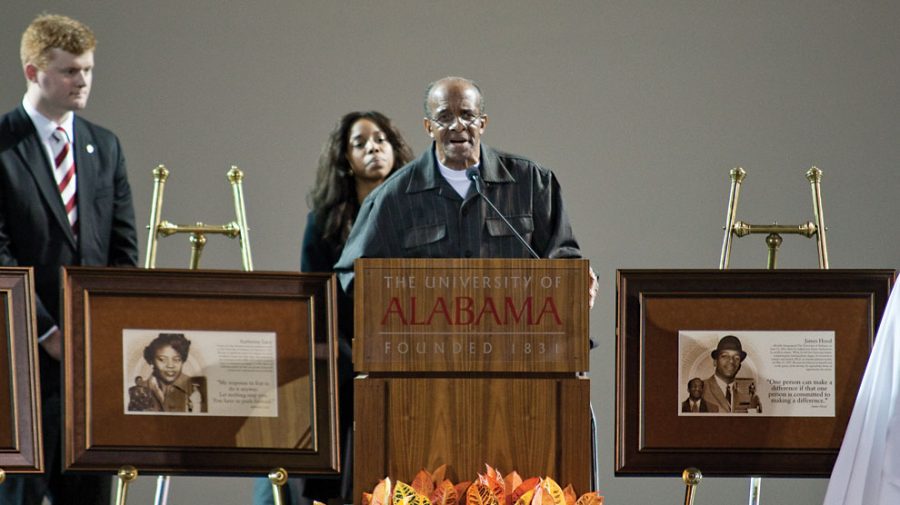All that remained of those historic first steps toward integration taken by Autherine Lucy, Vivian Malone and James Hood was a legacy. However, a clock tower and plaza now stand outside of Foster Auditorium as a concrete tribute to the efforts of three dauntless students who dared to make a difference.
“I think these individuals were important, not just to Alabama, but to the nation,” said U.S. Attorney General Eric Holder. “Barack Obama and I stand on their shoulders. The courageous actions of these people in the 1950s and 1960s made it possible for women and African Americans to find their voices.”
The Autherine Lucy Clock Tower is surrounded illuminating floodlights that transform the structure into a shining beacon at night. The archways near the pinnacle of the tower symbolize doorways that were opened to allow blacks access to the University.
“We hope the plaza and clock tower will inspire students to follow the lead of these courageous people who made an impact when their time came,” said Deborah Lane, with University Relations.
The construction of the monument was the collaborative effort of a University-wide team, including Financial Affairs, Transportation, Event Planning, University of Alabama Police Department, Student Affairs, Student Government Association and others, according to Lane.
The dedication ceremony was held inside Foster Auditorium due to inclement weather. The stage at the front of the room was decorated with plaques containing pictures of the honorees.
“We wanted to find photos that highlighted the individuals and not the events as a whole,” said University spokesman Bryan Hester. “The plaques were a huge labor of love that were several months in the making.”
These wooden tablets memorialize courage during a time of intense prejudice. “One person can make a difference if that person is committed to making a difference,” reads a quote from Hood on the inscription of one of the plaques.
The late Malone possessed an immense dedication to making an impact on the world throughout her life, according to family friend Wanda A. Howard.
“Vivian Malone left us a baton to pick up and run with,” Howard said. “That baton was to ensure our children and youth are prepared for high achievement when it is time to seize their moment.”
Words such as these continue to influence the paths of current University students today.
“In essence, these three people are the reason we are here,” said Coresa Nancy Hogan, President of the Black Student Union and one of the speakers. “The Black Student Union could not even exist without them. I became emotional as I made eye contact with the great leaders who have inspired so much change,” Hogan said.
Though some remember Lucy and Malone fearless in the midst of discrimination, Lucy laughingly disagrees.
“Of course I was scared,” Lucy said. “I just didn’t show it. You’d be scared too if you were driving in a car and people were throwing rocks at it, and you didn’t know how you were going to get home.”
She lingered gracefully in her brilliant red suit until the last student came to get her autograph. She smiled for each person she and even seemed excited to take countless pictures. Lucy said her speech during the ceremony came directly from the heart, and teasingly asked her friend why no one told her to bring a script.
SGA President James Fowler said he was touched by the beautiful, emotionally charged ceremony.
“It was a great opportunity for Autherine Lucy and James Hood to come back and share their experiences and advice,” Fowler said. “I think it was a special moment for the University community to reflect on the past and how far we’ve come.”
E. Culpepper Clark, author of “The Schoolhouse Door: Segregation’s Last Stand at the University of Alabama,” said it is essential to remember history. Knowing where we have come from is liberating, even though we might still have a long way to go.
“There is still so much hatred,” Lucy said. “But at the same time, there’s love. We need to find that.”









